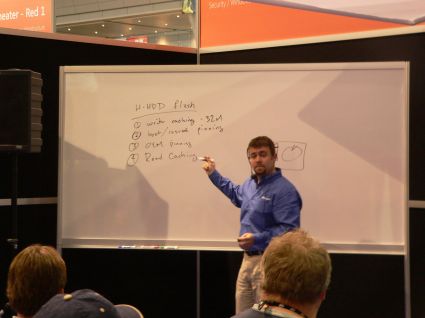TechEd 2006: Microsoft preps flash-based "performance accelerators" for Vista
Boston (MA) - Microsoft is working on a trio of technologies that will utilize flash memory as supplemental memory rather than as storage devices. Collectively referred to as "PC performance accelerators," Microsoft will debut SuperFetch, ReadyBoost and ReadyDrive to store and access frequently used data from peripheral flash devices and hyrbid hard drives.
The upcoming Vista will not only require dramatically more hardware horsepower than the current Windows XP. More details coming out of the currently held TechEd 2006 conference suggest that even simple hardware upgrades may not be the best choice for some users when upgrading to Vista. New features indicate that a completely new PC could be the best way to go.
Among these new demanding features are Microsoft's "PC performance accelerators," which take advantage of the general availability of flash memory.
ReadyDrive pertains to how the operating system utilizes the Flash memory from a hybrid hard drive. Microsoft program manager for Windows Client performance Matt Ayers told TechEd attendees that the initial cache size will be 256 MB, the first 32 MB will be exclusively reserved as a write cache. Up to 68 MB more may be set up for boot/resume pinning, which places frequently accessed sectors during power up or resumption from suspension, in non-volatile RAM, Ayers said "Pinning" refers to the remapping of sectors to memory locations, without actually relocating (and thus deleting) data from the hard drive.
The remaining memory is split between two functions. What memory isn't reserved by OEMs for pinning for their own purposes, is requisitioned for read pinning. At least this much of ReadyDrive memory acts like ReadyBoost memory at this point.
Microsoft's Matt Ayers demonstrates the memory allocation scheme for ReadyDrive, its memory management facility for hybrid hard drives.
SuperFetch, which was premiered at PDC in Los Angeles last September, will be a Vista feature that maintains frequently accessed data from the hard drive. ReadyBoost (which had in previous demonstrations been referred to as SuperFetch) will enable the operating system to requisition Flash memory from USB devices, or conceivably other sources, for use as higher-level read caches.
Get Tom's Hardware's best news and in-depth reviews, straight to your inbox.
Especially ReadyDrive appears to become a substantial performance-enhancing factor in Vista computers. Data that decisively proves how much faster hybrid hard drives will be than standard models, are not yet available, according to Ayers. The reason: The prototype models Microsoft presently tests utilize a grade of Flash memory that is pretty much as slow, as Flash goes. Production models are likely to use much faster grades, he said, though the effect of accelerating the Flash on performance speeds cannot yet be quantized. Still, he said the average seek time for a random access hard drive may be about 10 ms, while the speed Microsoft's team sees with the prototypes it's been given, is closer to 1 ms. Ayers would not say whether this speed was realized with a hybrid hard drive based on Samsung or Seagate technology.
Would the write cache for ReadyDrive memory truly offer a performance improvement, one attendee asked, given that standard HDDs already have a write cache that uses high-speed memory - presumably, higher speed than Flash? The performance improvement won't be realized as much during writes as during reads, Ayers admitted, although the true benefit of having a write cache, he believes, is that it enables the drive to spin down almost 90% of uptime, reducing wear on the drive and improving reliability and durability.
Related article:
Hybrid hard drives to become Vista Premium requirement
